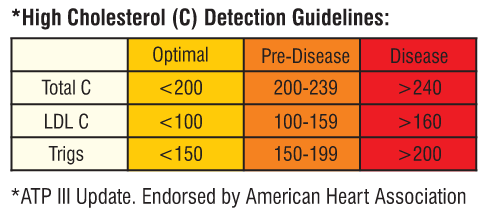Cholesterol comes from two sources: your body and food. Your liver and other cells in your body make about 75 percent of blood cholesterol. The other 25 percent comes from the foods you eat.
LDL cholesterol is the "bad" cholesterol. When too much of it circulates in the blood, it can clog arteries, increasing your risk of heart attack and stroke.
The American Heart Association endorses the National Cholesterol Education Program (NCEP) guidelines for detection of high cholesterol: All adults age 20 or older should have a fasting lipoprotein profile — which measures total cholesterol, LDL (bad) cholesterol, HDL (good) cholesterol and triglycerides — once every five years.
This test is done after a nine- to 12-hour fast without food, liquids or pills. It gives information about total cholesterol, LDL (bad) cholesterol, HDL (good) cholesterol and triglycerides.
